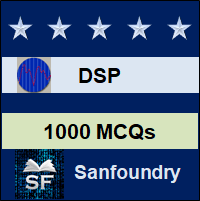
Digital Signal Processing Multiple Choice Questions Highlights
- 1000+ Multiple Choice Questions & Answers (MCQs) in Digital Signal Processing with a detailed explanation of every question.- These MCQs cover theoretical concepts, true-false(T/F) statements, fill-in-the-blanks and match the following style statements.
- These MCQs also cover numericals as well as diagram oriented MCQs.
- These MCQs are organized chapterwise and each Chapter is futher organized topicwise.
- Every MCQ set focuses on a specific topic of a given Chapter in Digital Signal Processing Subject.
Who should Practice Digital Signal Processing MCQs?
– Students who are preparing for college tests and exams such as mid-term tests and semester tests on Digital Signal Processing.- Students who are preparing for Online/Offline Tests/Contests in Digital Signal Processing.
– Students who wish to sharpen their knowledge of Digital Signal Processing Subject.
- Anyone preparing for Aptitude test in Digital Signal Processing.
- Anyone preparing for interviews (campus/off-campus interviews, walk-in interview and company interviews).
- Anyone preparing for entrance examinations and other competitive examinations.
- All - Experienced, Freshers and College / School Students.
Digital Signal Processing Chapters
Here's the list of chapters on the "Digital Signal Processing" subject covering 100+ topics. You can practice the MCQs chapter by chapter starting from the 1st chapter or you can jump to any chapter of your choice.- Discrete Time Signals and Systems
- DSP – Basic Signaling
- Z Transform and its Application – Analysis of the LTI Systems
- Frequency Analysis of Signals and Systems
- Discrete Fourier Transform – Properties and Applications
- DFT Efficient Computation – Fast Fourier Transform Algorithms
- Discrete Time Systems Implementation
- Digital Filters Design
- Multirate Digital Signal Procesing
- Sampling and Reconstruction of Signals
1. Discrete Time Signals and Systems
The section contains multiple choice questions and answers on discrete time systems, their analysis and implementation, discrete time signals, differential equations and the correlation of discrete time signals.
|
|
|
2. DSP – Basic Signaling
The section contains questions and answers on A/D and D/A converters, signal classification and signal and system processing.
|
|
|
3. Z Transform and its Application – Analysis of the LTI Systems
The section contains MCQs on Z transforms and its properties, types of Z transforms which include rational, inverse and one sided Z transform and their analysis.
|
|
|
4. Frequency Analysis of Signals and Systems
The section contains multiple choice questions and answers on frequency analysis of discrete and continuous time signals, fourier transform properties, convolution and de-convolution concepts, inverse systems, LTI systems and discrete time signals.
5. Discrete Fourier Transform – Properties and Applications
The section contains questions and answers on discrete fourier transforms, their sampling and properties, linear filtering methods on DFT and their frequency analysis.
|
|
|
6. DFT Efficient Computation – Fast Fourier Transform Algorithms
The section contains MCQs on computation of discrete fourier transforms and fast fourier transforms, various approaches to their computation which include filtering and quantization and applications of FFT algorithms.
|
|
|
7. Discrete Time Systems Implementation
The section contains multiple choice questions and answers on realization structures for discrete time systems, FIR system structures, IIR system structures, number representation, state space system analysis, quantization error analysis and bilinear transformations.
8. Digital Filters Design
The section contains questions and answers on the design of low pass butterworth filters and chebyshev filters, bilinear transformations, filter coefficient quantization, design considerations for filters, FIR filter design using windows, forward and backward difference methods, filter design using frequency sampling method, FIR differentiator design, Hilbert transformer design, IIR filter design, approximation of derivatives, impulse variance, analog filter characteristics, various approximation methods, sampling rate conversion and interpolation techniques.
9. Multirate Digital Signal Procesing
The section contains MCQs on factor decimation and multirate digital signal processing.
|
|
|
10. Sampling and Reconstruction of Signals
The section contains multiple choice questions and answers on A/D Converters and their oversampling, band pass signal sampling and representation, sample and hold concepts and quantization and coding techniques.
|
|
|
Wish you the best in your endeavor to learn and master Digital Signal Processing!
